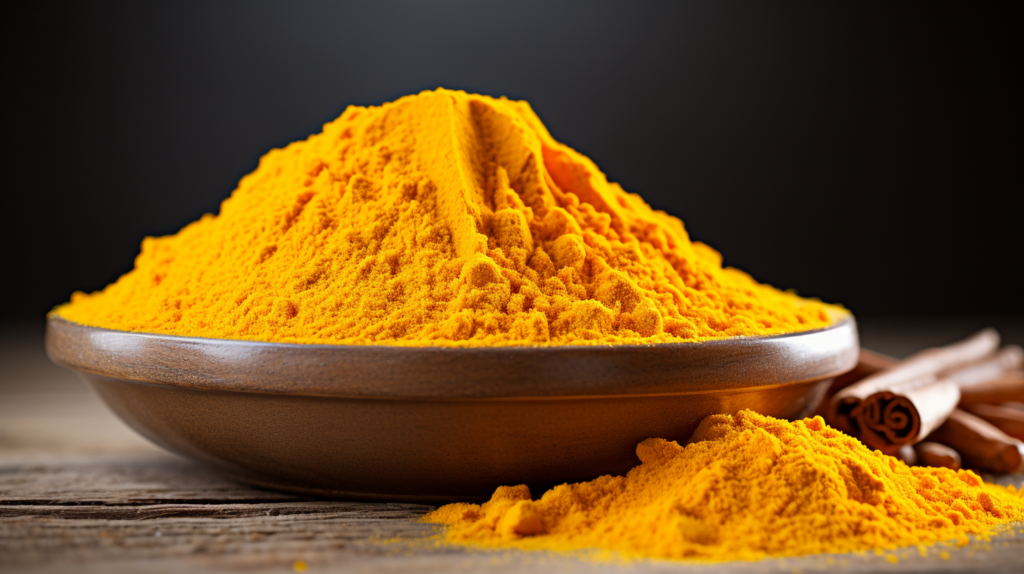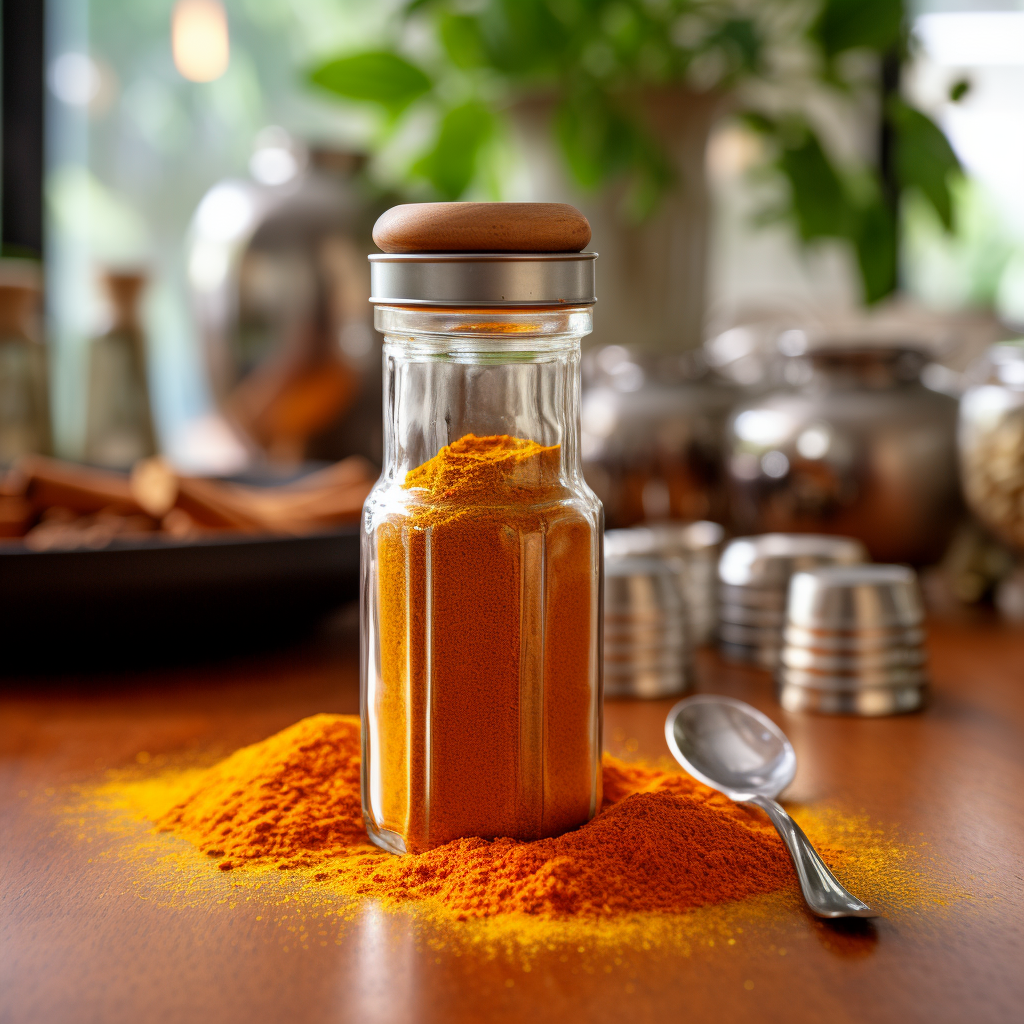If you suffer from inflammation or joint pain, you may already be familiar with the benefits of natural remedies. Turmeric, a spice commonly used in Indian cuisine, has been gaining popularity as a potent anti-inflammatory agent. Not only does turmeric help reduce inflammation, but it can also alleviate joint pain and improve overall health.
Research suggests that turmeric’s natural anti-inflammatory properties may be due to its active compound, curcumin. This powerful compound has been shown to inhibit the production of inflammatory molecules in the body, thus reducing inflammation and associated symptoms like pain and swelling.
Key Takeaways:
- Turmeric is a natural remedy that can help reduce inflammation and joint pain.
- Curcumin, the active compound in turmeric, plays a key role in reducing inflammation.

Understanding Turmeric’s Anti-Inflammatory Properties
Turmeric has gained popularity for its anti-inflammatory properties, which make it a natural remedy for various health conditions. Inflammation is linked to several chronic diseases such as heart disease, diabetes, and cancer. Therefore, reducing inflammation is vital for overall health and well-being.
The active ingredient in turmeric is curcumin, which has potent anti-inflammatory properties. Curcumin is a powerful antioxidant and has been shown to lower inflammation by preventing the activation of inflammatory molecules within the body.
Other Health Benefits of Turmeric
Turmeric has been studied for its potential benefits in promoting heart health, enhancing brain function, and protecting against cancer. Its antioxidant properties help neutralize harmful free radicals in the body and prevent oxidative damage that can lead to several chronic diseases.
Turmeric has also been shown to improve brain function and reduce the risk of age-related cognitive decline. Studies suggest that curcumin can increase levels of brain-derived neurotrophic factor (BDNF), a growth hormone that is important for brain function.
Furthermore, turmeric may help prevent cancer by reducing inflammation and oxidative damage. Studies have found that curcumin can suppress the growth and spread of cancer cells in laboratory and animal studies. However, more research is needed to determine its effectiveness in humans.

The Role of Curcumin in Reducing Inflammation
Turmeric owes its anti-inflammatory properties to curcumin, its active compound. Research has shown that curcumin can reduce inflammation by inhibiting various molecules that play a role in the inflammatory process.
| Curcumin’s Effects on Inflammation | How It Works |
|---|---|
| Reduces inflammation | Inhibits inflammatory molecules such as cytokines and chemokines |
| Decreases pain and swelling | Inhibits enzymes that contribute to inflammation and pain |
Curcumin also has antioxidant properties which help protect against damage by free radicals. Free radicals are unstable molecules that can cause oxidative stress, leading to inflammation and other chronic diseases.
Furthermore, curcumin has been shown to improve brain function and reduce the risk of heart disease, making it a valuable addition to your diet for overall health and well-being.

Scientific Evidence Supporting Turmeric’s Anti-Inflammatory Effects
There is significant scientific evidence suggesting that turmeric can effectively reduce inflammation in the body. One study published in the Journal of Alternative and Complementary Medicine found that individuals with osteoarthritis who took a turmeric supplement experienced a significant decrease in pain and stiffness compared to a placebo group.
Another study published in the journal Pharmacological Research investigated the anti-inflammatory effects of curcumin, the active compound in turmeric. The study found that curcumin was effective in reducing inflammation in a variety of conditions, including arthritis, asthma, and cardiovascular disease.
Curcumin has also been shown to inhibit several different molecules that play a role in inflammation, including COX-2, NF-kB, and cytokines. Inhibiting these molecules can lead to decreased inflammation in the body.
Overall, the scientific evidence supporting the anti-inflammatory effects of turmeric and curcumin is promising and suggests that incorporating turmeric into your routine can be a natural and effective way to manage inflammation.

Turmeric Supplements for Inflammation
If you’re considering using turmeric to reduce inflammation, you may want to try taking a turmeric supplement. Turmeric supplements are available in various forms, including capsules, tablets, powders, and extracts.
When selecting a supplement, it’s important to choose a reputable brand and look for products that contain high levels of curcumin, the active compound in turmeric responsible for its anti-inflammatory effects.
The recommended dosage of turmeric supplements for inflammation varies depending on the specific product and concentration. However, a typical dose can range from 500-2000mg per day.
It’s important to note that turmeric supplements may not be suitable for everyone. Individuals with certain health conditions, such as gallbladder disease, should avoid taking turmeric supplements. Additionally, turmeric may interact with certain medications, so it’s important to speak with your healthcare provider before incorporating turmeric supplements into your routine.

Integrating Turmeric into Your Daily Routine
If you’re looking to integrate turmeric into your daily routine to enjoy its anti-inflammatory benefits, there are a few ways to do so. One easy option is to add turmeric powder to your meals, such as curries, stews, or soups. You can even sprinkle some on roasted vegetables or eggs.
Another option is to make a turmeric latte by adding a teaspoon of turmeric powder to warm milk and sweetening it with honey or maple syrup. This is a delicious and soothing way to enjoy turmeric’s benefits, especially before bedtime.
If you prefer a more potent and convenient option, turmeric supplements are also available in various forms, including capsules, powders, and extracts. However, it’s important to consult with a healthcare professional before taking any supplements, especially if you’re on medication or have underlying health conditions.

Turmeric’s Effects on Joint Pain
If you suffer from joint pain, turmeric may offer relief. The anti-inflammatory properties of turmeric can reduce swelling and stiffness in the joints, reducing pain and discomfort.
Curcumin, the active compound in turmeric, inhibits the production of inflammatory cytokines, which are responsible for causing joint pain and inflammation. As a result, turmeric can be an effective natural remedy for individuals with arthritis and other joint conditions.
Studies have shown that turmeric can help reduce joint pain and improve mobility in individuals with osteoarthritis and rheumatoid arthritis. The benefits of turmeric for joint pain can be enhanced when combined with other natural remedies, such as ginger or omega-3 fatty acids.
Adding turmeric to your diet or taking it in supplement form can help alleviate joint pain and inflammation. However, it is important to consult with a healthcare professional before taking any supplements, especially if you are on medication or have a pre-existing medical condition.

Other Health Benefits of Turmeric
In addition to its powerful anti-inflammatory effects, turmeric has also been associated with several other health benefits. Here are some of the potential advantages of incorporating this spice into your routine:
- Antioxidant Properties: Turmeric contains compounds that may help protect against oxidative damage and lower the risk of chronic diseases.
- Digestive Benefits: Some studies have shown that turmeric may help improve digestion and relieve symptoms of digestive issues like bloating and gas.
- Promotes Overall Well-Being: Turmeric’s potential anti-inflammatory and antioxidant effects may contribute to overall health and wellness. It may also help improve brain function and mood.
While more research is needed to fully understand these benefits, incorporating turmeric into your daily routine may offer a range of health advantages beyond reducing inflammation and joint pain.

Precautions and Considerations
While turmeric has numerous potential health benefits, it is important to take precautions and consider potential risks before incorporating it into your routine.
Firstly, if you are considering taking turmeric supplements for inflammation, it is important to speak with your healthcare professional. Turmeric supplements may interact with certain medications, such as blood thinners, and may not be appropriate for individuals with specific health conditions.
Additionally, taking high doses of turmeric supplements or consuming large amounts of turmeric can lead to side effects such as digestive issues, headaches, and dizziness. It is important to follow recommended dosages and consume turmeric in moderation.
Furthermore, while turmeric is generally considered safe for most individuals, some may experience allergic reactions. If you experience any adverse reactions such as swelling or difficulty breathing, stop using turmeric immediately and seek medical attention.
Finally, it is important to note that while turmeric may help reduce inflammation and alleviate joint pain, it should not be used as a replacement for medical treatment. Always consult with your healthcare professional before making any changes to your healthcare routine.

Conclusion
As you have learned throughout this article, turmeric is a powerful natural remedy for reducing inflammation and joint pain. Its anti-inflammatory properties are due to the active compound curcumin, which has been scientifically proven to be effective in managing inflammation.
Not only can turmeric help with joint pain, but it also offers a range of additional health benefits, such as promoting digestive health and offering potential antioxidant effects.
If you are interested in incorporating turmeric into your daily routine as a natural remedy for inflammation, there are various options available, including adding it to your meals or taking turmeric supplements. However, it is important to take precautions and consider potential side effects or interactions with medications before doing so.
Overall, turmeric is an accessible and natural way to alleviate symptoms of inflammation and improve your overall health. Give it a try and see how it can benefit you!
FAQ
Q: How does turmeric naturally reduce inflammation and joint pain?
A: Turmeric contains compounds that have anti-inflammatory properties, which can help reduce inflammation in the body. These compounds, such as curcumin, can target inflammatory pathways and alleviate joint pain.
Q: What are the benefits of turmeric for inflammation?
A: Turmeric can help reduce inflammation in the body, which can provide relief for individuals suffering from conditions such as arthritis or other inflammatory disorders. It can also support overall health and well-being.
Q: What is the role of curcumin in reducing inflammation?
A: Curcumin, the active compound in turmeric, has been found to inhibit various molecules and enzymes involved in inflammation. It can help regulate the immune response and reduce inflammation in the body.
Q: Is there scientific evidence supporting turmeric’s anti-inflammatory effects?
A: Yes, several scientific studies have demonstrated the anti-inflammatory effects of turmeric. Research has shown that turmeric can reduce inflammation markers in the body and provide relief for individuals with inflammatory conditions.
Q: Are there turmeric supplements available for inflammation?
A: Yes, there are turmeric supplements available in various forms, such as capsules or powders. These supplements can be a convenient option for individuals looking to incorporate turmeric into their routine for managing inflammation.
Q: How can I integrate turmeric into my daily routine?
A: There are several ways to incorporate turmeric into your daily routine. You can add it to your meals or drinks, or you can take it as a supplement. It is important to follow recommended dosages and consult with a healthcare professional if needed.
Q: Can turmeric help with joint pain?
A: Yes, turmeric can help alleviate joint pain, which is often associated with inflammation. It can reduce inflammation in the joints and provide relief for individuals suffering from arthritis or other joint conditions.
Q: Are there other health benefits of turmeric?
A: Yes, turmeric has additional health benefits beyond its anti-inflammatory effects. It has potential antioxidant properties, digestive benefits, and it can contribute to overall well-being.
Q: What precautions should I consider when using turmeric for inflammation?
A: It is important to be aware of potential side effects and interactions with medications when using turmeric for inflammation. Individuals with specific health conditions should consult with a healthcare professional before incorporating turmeric into their routine.














